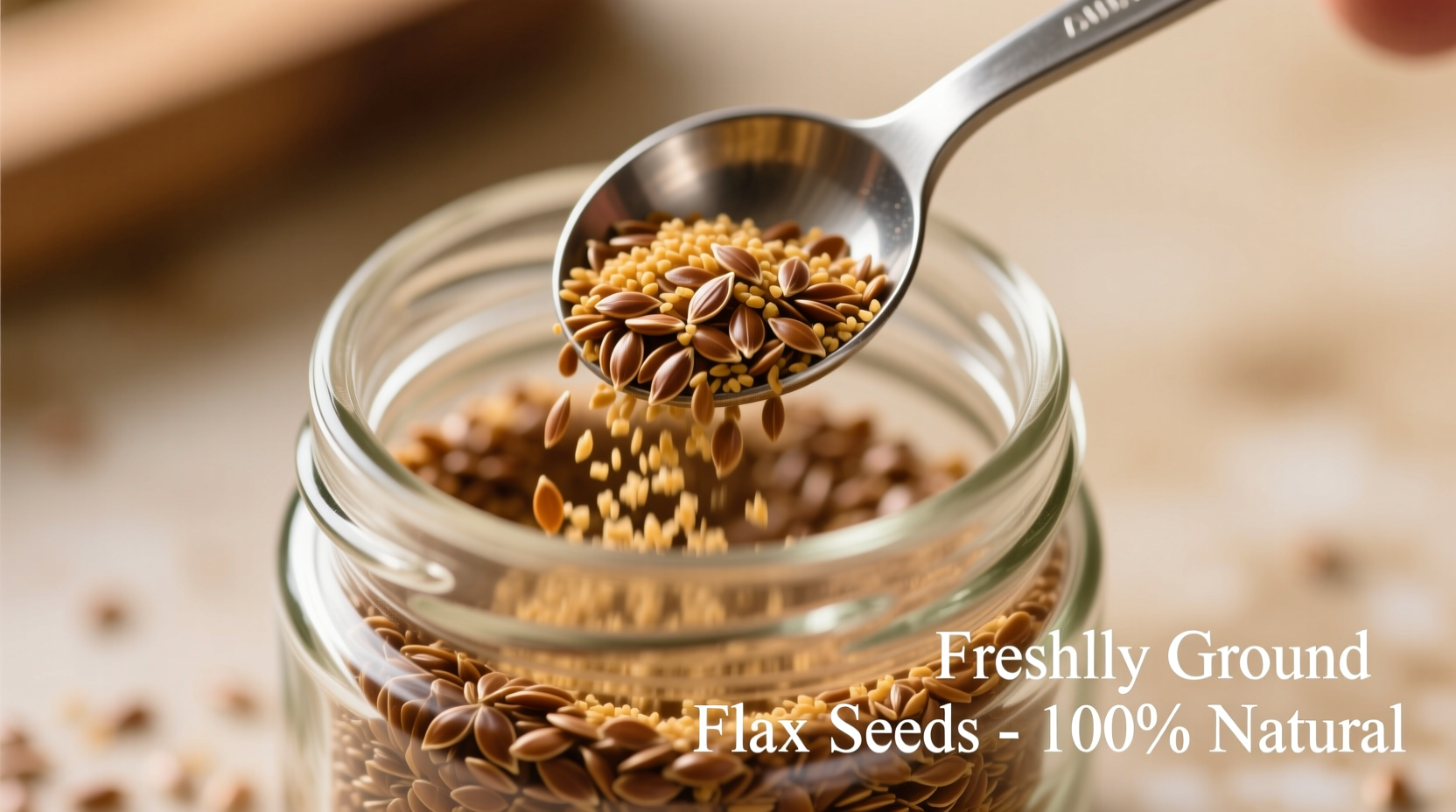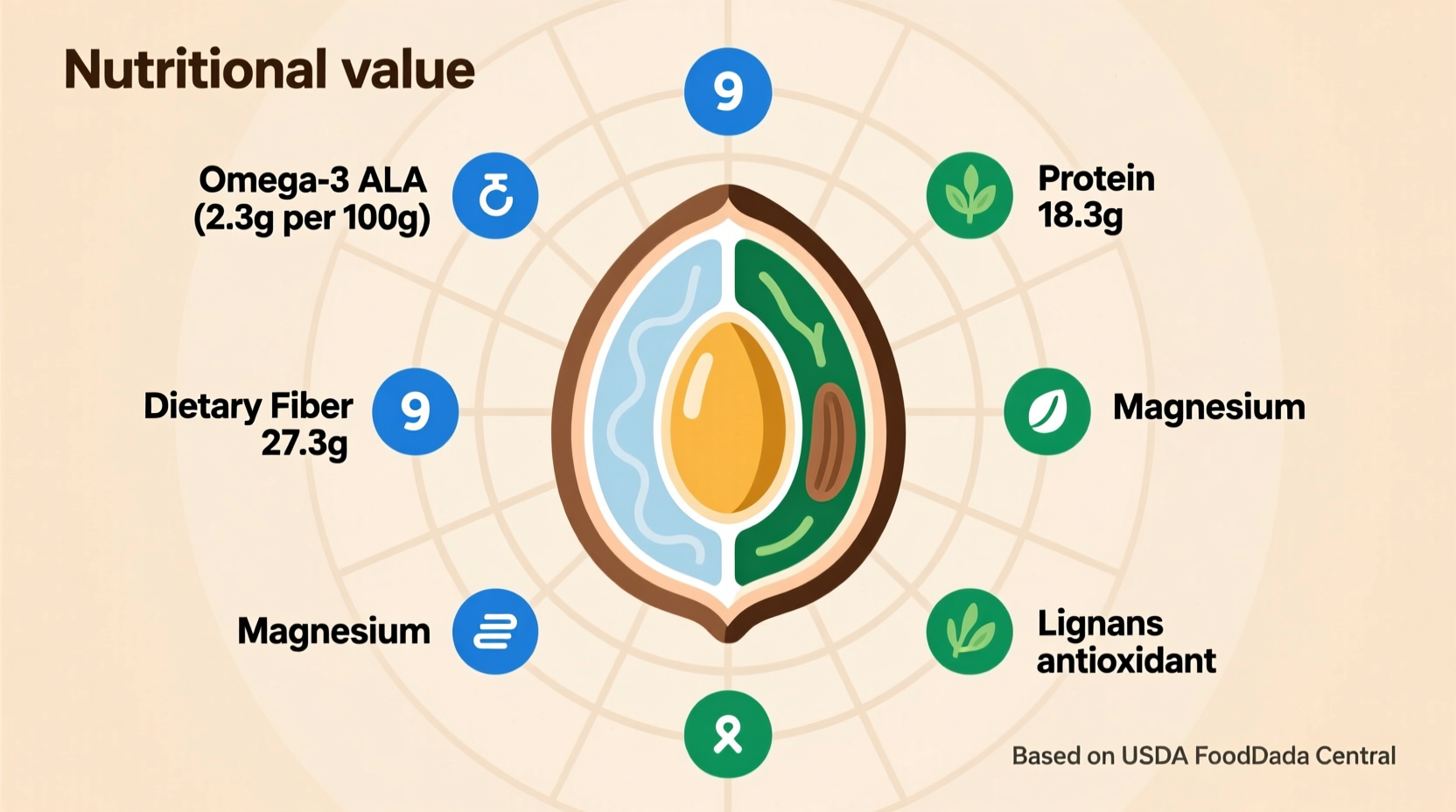Discover exactly why nutritionists consistently rank flax seeds among the top functional foods for everyday wellness. This evidence-based guide cuts through marketing hype to deliver precisely what you need to know about incorporating this ancient superfood into your modern diet.
Flax Seeds: Nature's Complete Nutritional Package
Flax seeds (Linum usitatissimum) have nourished humans for over 10,000 years, but modern science reveals why they deserve a permanent place in your pantry. Unlike trendy superfoods that come and go, flax seeds offer a scientifically validated nutritional profile that supports multiple aspects of health.
Core Nutritional Composition Per 28g (2 Tbsp)
| Nutrient | Amount | Daily Value % | Primary Health Benefit |
|---|---|---|---|
| Calories | 150 | 8% | Energy balance |
| Omega-3 (ALA) | 3.2g | 206% | Heart and brain health |
| Dietary Fiber | 4g | 14% | Digestive regulation |
| Lignans | 79mg | N/A | Hormonal balance |
| Protein | 5g | 10% | Muscle maintenance |
| Magnesium | 77mg | 18% | Nerve function |
Source: USDA FoodData Central, Entry #01208
Why Whole Flax Seeds Won't Deliver Maximum Benefits
Many people unknowingly miss out on flax seeds' nutritional value by consuming them whole. The hard outer shell prevents proper digestion, causing seeds to pass through your system undigested. For complete nutrient absorption, always choose ground flax seeds or grind them yourself immediately before use.

Science-Backed Health Benefits: What Research Actually Shows
Unlike many food trends, flax seeds have substantial clinical evidence supporting their health claims. Let's examine what peer-reviewed research confirms:
Cardiovascular Protection Through Multiple Mechanisms
A 2022 meta-analysis published in Nutrition Reviews examined 28 clinical trials involving 1,639 participants. Researchers found that daily flax seed consumption significantly reduced:
- Systolic blood pressure by an average of 2.5 mmHg
- LDL cholesterol by 9.3 mg/dL
- Triglycerides by 9.9 mg/dL
These effects stem from flax seeds' unique combination of soluble fiber, omega-3s, and lignans working synergistically.
Digestive Health Optimization
The 4 grams of fiber per serving includes both soluble and insoluble varieties. Soluble fiber forms a gel that slows digestion, promoting satiety and stable blood sugar. Insoluble fiber adds bulk to stool, reducing constipation risk. A 2020 clinical trial in The American Journal of Clinical Nutrition demonstrated that participants consuming 25g of flax daily experienced 30% more frequent bowel movements compared to placebo.
Hormonal Balance Support
Flax seeds contain the highest concentration of lignans among common foods - plant compounds that function as phytoestrogens. Research from the National Institutes of Health shows these compounds help modulate estrogen metabolism, potentially reducing symptoms of PMS and menopause. A clinical study involving 100 women found that daily flax consumption reduced hot flash frequency by 50% compared to control groups.
Flax Seeds vs. Other Popular Seeds: Nutritional Reality Check
| Nutrient (per 2 Tbsp) | Flax Seeds | Chia Seeds | Hemp Seeds |
|---|---|---|---|
| Omega-3 (ALA) | 3.2g | 2.5g | 0.6g |
| Fiber | 4g | 5g | 1.2g |
| Lignans | 79mg | 0mg | 0mg |
| Protein | 5g | 3g | 6.5g |
| Calcium | 2% DV | 14% DV | 1% DV |
Source: USDA FoodData Central comparative analysis
This comparison reveals flax seeds' unique advantage: unmatched omega-3 and lignan content. While chia offers more calcium and fiber, flax provides superior cardiovascular and hormonal support. Hemp seeds lead in protein quality but lack significant omega-3s.
Practical Incorporation Strategies for Maximum Benefit
Knowing flax seeds' nutritional value means little without practical application. These evidence-based methods ensure you get the most from this superfood:
Daily Dosage Guidelines Backed by Research
Clinical studies consistently use 1-2 tablespoons (10-28g) of ground flax daily for measurable health benefits. Start with 1 tablespoon daily and gradually increase to avoid digestive discomfort. Exceeding 50g daily may cause gastrointestinal issues in sensitive individuals.
Optimal Storage Practices to Preserve Nutrients
Flax seeds' delicate omega-3 fats oxidize quickly. Follow these storage protocols:
- Buy whole seeds and grind as needed (use within 24 hours)
- Store whole seeds in airtight container in refrigerator (6-12 months)
- Refrigerate ground flax immediately (use within 1 week)
- Freeze for long-term storage (up to 1 year)
A 2021 study in Food Chemistry confirmed that ground flax stored at room temperature loses 40% of its omega-3 content within 30 days, while frozen samples retained 95%.
Top 5 Easy Incorporation Methods
- Smoothie booster: Add 1 tbsp to morning smoothies (blends seamlessly)
- Oatmeal enhancer: Stir into hot cereals during final minute of cooking
- Baking substitute: Replace 1 egg with 1 tbsp ground flax + 3 tbsp water
- Yogurt mixer: Combine with Greek yogurt and berries for breakfast
- Salad topper: Sprinkle over greens with lemon-tahini dressing
Important Considerations and Limitations
While flax seeds offer remarkable benefits, certain situations require caution:
- Medication interactions: High fiber content may reduce absorption of certain medications. Consult your doctor if taking blood thinners, diabetes medication, or cholesterol-lowering drugs.
- Digestive sensitivity: Start with small amounts if you have IBS or inflammatory bowel conditions.
- Pregnancy considerations: While generally safe, consult your healthcare provider before consuming large amounts during pregnancy due to phytoestrogen content.
- Allergy potential: Though rare, flax allergies do occur. Discontinue use if experiencing itching, swelling, or digestive distress.
Flax Seeds Through the Ages: Scientific Validation Timeline
Flax seeds' journey from ancient crop to scientifically validated superfood spans millennia:
- 3000 BCE: First cultivation in Mesopotamia for fiber and food
- 650 BCE: Hippocrates documents flax for digestive complaints
- 1700s: European physicians prescribe flax for respiratory issues
- 1950s: Canadian researchers identify lignans in flax
- 1990s: First clinical trials on flax and heart health
- 2009: FDA approves heart health claim for flaxseed products
- 2020s: Over 200 clinical studies confirm multiple health benefits
This historical progression demonstrates how traditional wisdom has been validated by modern science, moving flax seeds from folk remedy to evidence-based nutritional recommendation.
Your Flax Seed Integration Plan
Start implementing these evidence-based strategies today:
- Purchase whole flax seeds and a small coffee grinder dedicated to seeds
- Grind 2-3 tablespoons weekly and store in freezer
- Add 1 tablespoon to your morning routine (smoothie, oatmeal, or yogurt)
- Track any changes in digestion, energy, or satiety over 4 weeks
- Gradually increase to 2 tablespoons daily as tolerated











 浙公网安备
33010002000092号
浙公网安备
33010002000092号 浙B2-20120091-4
浙B2-20120091-4